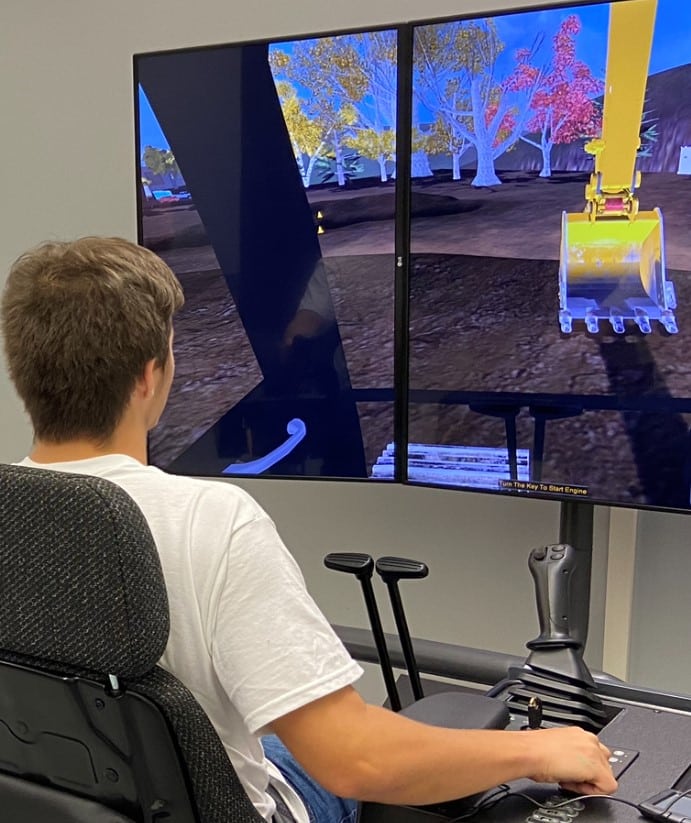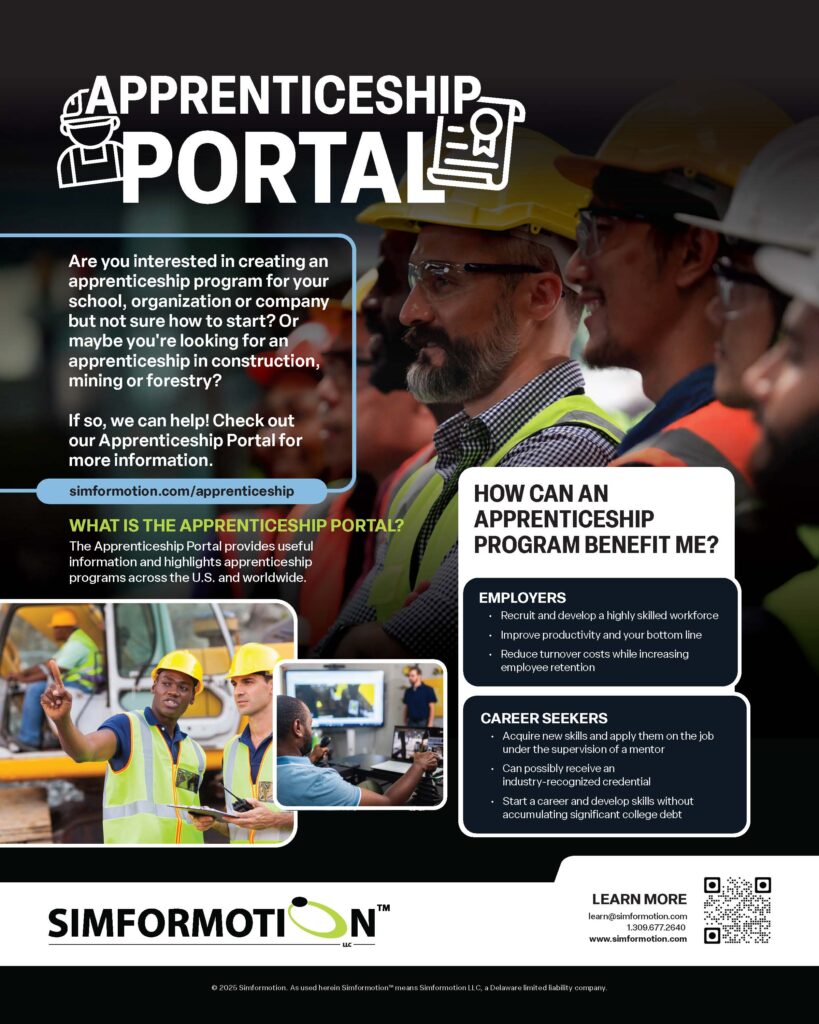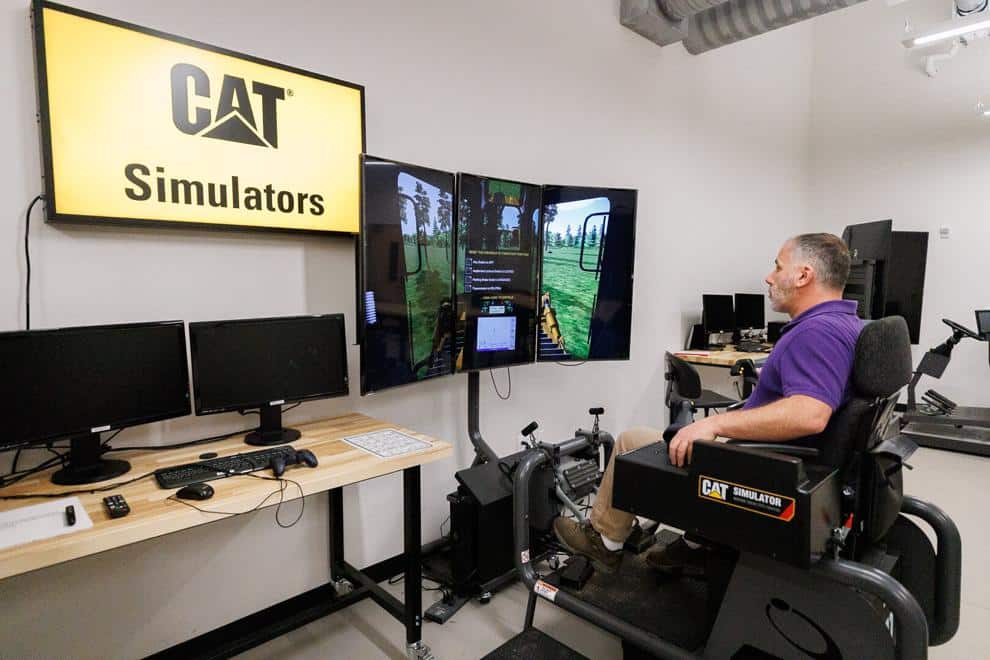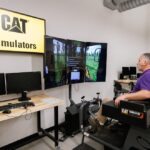Cat® Simulators systems along with SimScholars™ heavy equipment operator (HEO) curriculum are playing key roles in the state of Georgia’s newly launched HEO simulator training program.
The new HEO program is one of Georgia’s 17 Career Clusters/Pathways which provide a structure for organizing and delivering quality Career, Technical and Agricultural Education (CTAE) programs in Georgia’s public high schools. The HEO program provides a pathway for students in 12 high schools and career technical centers throughout the state of Georgia to learn and enter the construction industry.
C.W. Matthews Contracting Co., Inc. recently piloted the program with its employees and deemed the program as very effective in placing individuals on the “fast track” to becoming heavy equipment operators in the horizontal construction industry. Jeremy Whitaker, C.W. Matthews Director of Training & Recruitment, attributes much of the program’s success to the Cat Simulators systems and SimScholars™ curriculum.

“Cat Simulators are the main focus of the program because the simulators are so authentic to the real equipment,” said Whitaker who explained how the SimScholars curriculum provides instructors with a course overview, exercise objectives, learning outcomes, lesson plans, step-by-step procedures, checklists/schedules, student management tools, quizzes and pre/post-tests. “The simulators, along with the SimScholars curriculum, really puts our students on the fast track to becoming operators.”
The program consists of three classes, Industry Fundamentals & Occupational Safety (the beginning course for all construction pathways in Georgia), Intro to Heavy Equipment: Excavator and Heavy Equipment 1: Bulldozer. Instructors split the class into two groups starting in the Intro to Heavy Equipment class.
Group 1 students complete in-class learning using the SimScholars curriculum. They learn in-depth reasons on why they need to operate machines a certain way. Meanwhile, students in Group 2 experience hands-on excavator training on the Cat Simulators systems and complete exercises like the Machine Walkaround, Bench & Truck Loading, Trench Box & Pipe and Trenching, just to name a few. Once both groups finish their objectives, they switch places. The in-class students train on the simulators and the simulator students complete the in-class learning.
During the second and third classes in the HEO pathway, industry partners provide “vision trips” to the students which benefit both the industry partners and students. The partners have the opportunity to build relationships with the students; the students get to experience the real equipment and see skilled operators run the machines.
Whitaker explained during the vision trips students see that the controls on the simulators are the same as the controls on the real iron. “Having the same controls on the simulator as the real equipment is very important. It makes the learning curve less steep when they move to the real equipment.”
“Cat® Simulators are the main focus of the program because the simulators are so authentic to the real equipment,” said Whitaker who explained how the SimScholars curriculum provides instructors with a course overview, exercise objectives, learning outcomes, lesson plans, step-by-step procedures, checklists/ schedules, student management tools, quizzes and pre/post-tests.
At the end of the second and third classes in the pathway, industry partners host students at real jobsites where students perform their “Capstone Projects.” The students’ capstone projects require them to perform the same series of tasks on the real equipment as they did on the simulators. During the capstones, seasoned operators observe the students and make sure they adhere to strict safety guidelines.
“Students are familiar and comfortable with the real machines because of the time they’ve spent learning and practicing on the simulators.” Whitaker continued, “Transitioning from the simulator to the real equipment is like putting on a comfortable pair of boots that you’ve broken in. You’re already familiar and comfortable with them. The students are able to make an impact in the field on the real equipment on day one.”
Whitaker explained that students who successfully complete the entire program along with their capstone project and who receive a favorable evaluation and recommendation from their CTAE instructor will have a variety of career opportunities in the horizontal construction industry from contractors across the state.
“We are thankful for all the support this new pathway has received,” commented Whitaker. “Our intent is to continue to work with the Georgia General Assembly to budget additional funding so that more programs can be launched across the state to impact students while meeting our industry’s workforce demand.”
“Transitioning from the simulator to the real equipment is like putting on a comfortable pair of boots that you’ve broken in. You’re already familiar and comfortable with them. The students are able to make an impact in the field on the real equipment on day one.”





